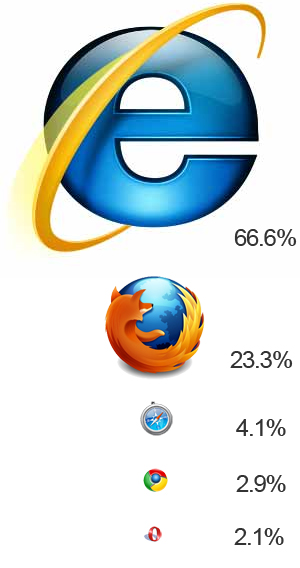Internet Explorer posts largest loss since '08; Firefox, Chrome, Safari gain


Meanwhile, Google's Chrome continues to gain on Apple's Safari, closing within 1.25 percentage points. At its current pace, Chrome will replace Safari as the No. 3 browser in less than a year.
Internet Explorer dropped 1.1 percentage points last month, to 66.6 percent. The slide was the browser's steepest since last November, when it dropped by 2 percentage points, according to Net Applications.
In the last 12 months, IE has lost 8.6 points of browser share.
Of that lost market share, Mozilla's Firefox stood to benefit the most, taking about half that lost share to claim 23.3 percent of the market, nearly matching its record 23.8 percent set in April.
Here's the breakdown of last month:
- Internet Explorer: 66.6%
- Mozilla Firefox: 23.3%
- Apple Safari: 4.1%
- Google Chrome: 2.9%
- Opera: 2.1%
The takeaway here? IE continues to lose dominance without much to support it. Since these statistics were taken last month, there's no Windows 7 to consider, no Snow Leopard, and a lot of netbooks -- mostly running Windows XP -- flooding the market.
So we're really just seeing more of the same trend that's been accelerating in recent months: people opting out of using IE because:
- It's too slow to run satisfyingly on a netbook (+1 Firefox, Chrome, Opera)
- Slight increase in Macs on the market (+1 Safari)
- No Windows 7 at this time to drive default use (-1 IE)
Still, the figures show just how much of an incredible grip IE has on the general public.
But the game's going to get very interesting right around January 2010. Why? Because Windows 7 will be on the market, the Q4 2009 holiday sales rush will move Windows 7 computers (notebooks and netbooks) off shelves, Apple's recently released Snow Leopard will be adopted by more users, and Google's distribution strategy to get Chrome on PCs will start paying off.